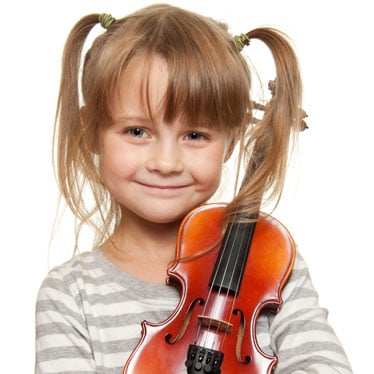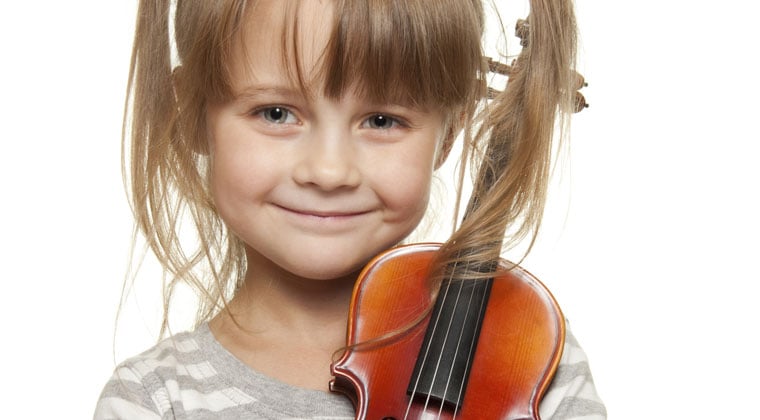
 As a parent, you work to provide your children with as many opportunities to succeed as possible, and you are probably aware of the benefits a music education offers. Over the past few decades, scientific studies have explored the countless ways that music training helps foster brain development. Indeed, it is one of the most effective methods known to assist cognitive growth, build motor skills, and enhance learning comprehension among children.
As a parent, you work to provide your children with as many opportunities to succeed as possible, and you are probably aware of the benefits a music education offers. Over the past few decades, scientific studies have explored the countless ways that music training helps foster brain development. Indeed, it is one of the most effective methods known to assist cognitive growth, build motor skills, and enhance learning comprehension among children.
However, many parents wonder when children should start lessons. With all of the information available, they simply aren’t sure when to introduce violin for beginners and don’t want to miss out on the critical time frame.
Recent studies have shown that the earlier music instruction is begun, the better. Most agree that beginning violin training before the age of seven offers the most definitive results. Apparently brain development, especially from age four to seven, is particularly susceptible to the improvements music instruction offers. Yet, does that mean that starting later won’t be a benefit?
Actually, the answer, like so many other violin decisions, is a very personal one. If you’re unsure about when children should start lessons, these guidelines can help aid your judgement so that you can help ensure that your child gets the most from a music education.
Early Immersion
As mentioned, there are plenty of findings that suggest music training should start before age seven, but that doesn’t mean that you can’t start building a foundation much earlier than that. In fact, if you want your child to enjoy music training later in life (which is instrumental for success), fostering a love of music early on is crucial.
From birth to age two, you can introduce basic music concepts that your child will love. Simple movement activities like swaying or rocking rhythmically to music, clapping your hands, or singing to your baby or toddler can help forge cognitive connections related to sound.
By age three, you can begin to enlarge your child’s exposure to the more “formal” elements of music. A weekly class at your local community center is a great option, but you can still do this type of early training at home. It should center on the fundamental recognition of rhythm, melody, or just identifying different musical instruments with flashcards and recordings.
One of the biggest mistakes parents can make is to start instrument training too early. If you start violin training before your child is ready, the pressure can lead to resentment and rebellion. In fact, while pleasurable activities positively influence cognitive growth, studies have shown that forcing young children to practice/learn an instrument can produce an excess of cortisol, a stress hormone that is detrimental (even damaging) to brain development.
The most important thing to focus on at this age is making your “informal” music lessons fun. If your child is throwing tantrums or has to be compelled to participate, any potential benefits of beginning violin at this time will be negated.
Violin for Kids
Once your child is preschool age (four to five years old), this is a great time to see if he or she is interested in instrument training. Violins are available in fractional sizes, so you shouldn’t have a problem finding one that fits your child’s height, arm length, etc.
It’s a good idea to solicit your child’s involvement of the process of choosing the violin and the instructional method. Private lessons are excellent, but there are also a number of online or software programs available that are specifically tailored for teaching violin for beginners. These type of options are usually very affordable and feature games and interactive lessons that make learning a joy, rather than a chore.
Take your time. You don’t want to destroy the natural enthusiasm you’ve fostered by enrolling your child in a class she doesn’t like. The idea is to continue to nurture your child’s interest through a fun method of instruction.
Determining the Perfect Age to Start Violin Lessons
There’s really no perfect, one-size-fits-all “age” to begin violin training. It’s a personal decision. And although research does suggest that starting instrument training before age seven has the most impact on development, that doesn’t mean that your child can’t start later and still gain the advantages that music instruction offers. It only means that it will take a little more effort and attention to learn.
The most important consideration is your child’s preference. Some kids will want to start very early, while for others, they might not feel an inclination until they are older. The key for parents is to introduce musical concepts early on and then let natural curiosity dictate when children should start lessons formally with the violin. Following this strategy will help ensure that your child gets the most from the training.

